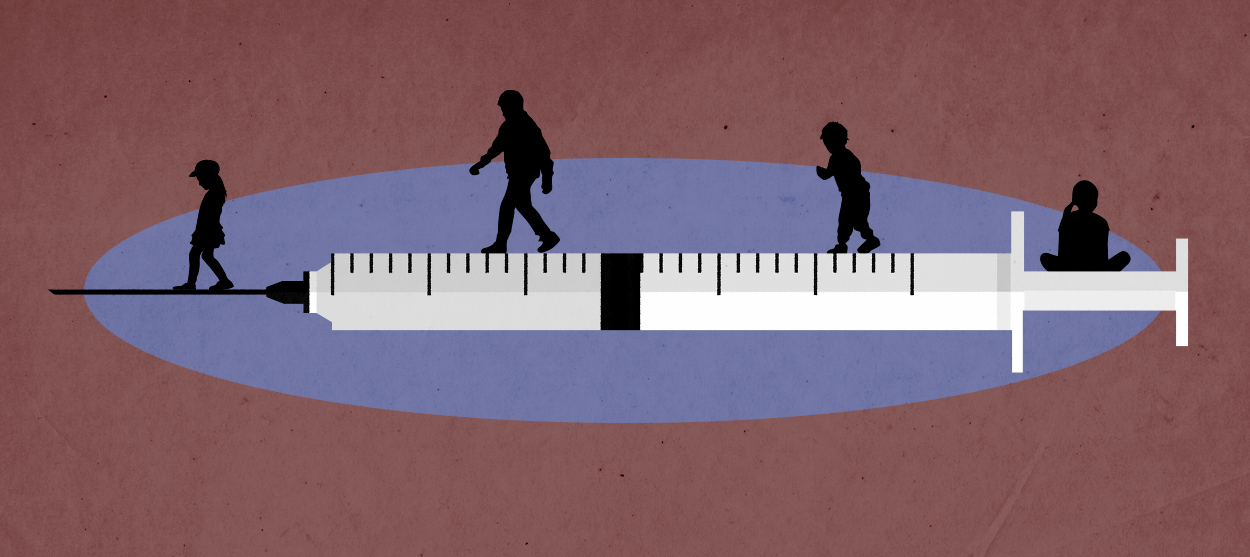The week's best parenting advice: March 16, 2021
What to know about vaccines for babies, how to apologize to your child, and more


A free daily email with the biggest news stories of the day – and the best features from TheWeek.com
You are now subscribed
Your newsletter sign-up was successful
1. Vaccines for babies, toddlers, and young kids
Moderna announced this week that it has started studying its COVID-19 vaccine in children between the ages of 6 months and 11 years old. The company expects to enroll 6,750 healthy participants under the age of 12 in the United States and Canada for the study, which will "help us assess the potential safety and immunogenicity of our COVID-19 vaccine candidate in this important younger age population," Moderna CEO Stéphane Bancel said. Dr. Anthony Fauci predicted last month there should be enough data "to be able to say that elementary school children will be able to be vaccinated" by the first quarter of 2022, and he also said that high school kids should be able to get vaccinated "sometime this fall."
2. Sorry I snapped
Parents are humans, and humans sometimes get irritated and snap at one another. In fact, shielding negative emotions from kids is a form of toxic positivity, says Jennie Hudson, a professor of clinical psychology at the University of New South Wales in Australia. But "how do I walk that line between showing my children that I have feelings that aren't always positive, but not letting my irritation erupt, uncontrolled?" asks Jessica Grose at NYT Parenting. It's a difficult balance to strike, but it's what happens after you yell or lose your temper that matters most in fostering healthy emotional development, Grose says. First, take a break to calm yourself down. Go for a walk, scream into a pillow, or whatever it is you need to do. When you've chilled out, it's time to apologize. Acknowledge your mistake and talk about ways you could have handled the situation better so that "it's a learning opportunity for a child," says Hudson.
The Week
Escape your echo chamber. Get the facts behind the news, plus analysis from multiple perspectives.

Sign up for The Week's Free Newsletters
From our morning news briefing to a weekly Good News Newsletter, get the best of The Week delivered directly to your inbox.
From our morning news briefing to a weekly Good News Newsletter, get the best of The Week delivered directly to your inbox.
3. Skip the chocolate eggs
Easter is fast-approaching, and whether you're religious or not, you may want to celebrate with an Easter basket for your kiddo. If you want to avoid stuffing it with candy, Meghan Moravcik Walbert at Lifehacker has some creative suggestions for alternative treats. Art supplies, for example, are always a safe bet, especially when they have a seasonal twist. "Crayons are great all year round, but bunny-shaped crayons are extra special this time of year," she says. Summer is (hopefully) around the corner and that means kids will be spending more time outside, so sunglasses are a nice Easter gift. And books are "the perfect basket-filler when you need a little extra something," Moravcik Walbert says.
4. Just one more bite!
Kids are often picky eaters, leaving parents to resort to mealtime tactics like bargaining, bribing, or coaxing. But experts say it's best to avoid phrases like, "just one more bite," or "eat your dinner if you want dessert," because they can "confuse children and force them to choose between their body's natural cues and obeying their parents," and could lead to disordered eating down the line, according to Moms.com. Instead, parents should teach kids to identify what it feels like to be hungry and full and encourage them to listen to their bodies. Parents should also look for cues that their child just isn't hungry — like playing with or ignoring food. If you see this, ask your child if they're full, and then back off.
A free daily email with the biggest news stories of the day – and the best features from TheWeek.com
5. A common discipline mistake
Discipline is one of the hardest parts of parenting, and when it comes to tantrum-prone toddlers it's especially challenging. But Kristin Gallant and Deena Margolin at Big Little Feelings have a tip: It's called using "related consequences." When your child misbehaves — let's say they drew on the wall with markers — instead of punishing them with unrelated and delayed consequences like no dessert, or no TV later, choose consequences that are "completely and directly related to the undesired behaviors." In the markers example, a parent using related consequences would simply take away the markers for the rest of the day. "Because the consequence was both quick and relevant, you've set up your toddler's brain for success," they say. This works because toddlers struggle to recall events from earlier in the day and connect them to the present moment, and "without this connection, there will be no correction."
Jessica Hullinger is a writer and former deputy editor of The Week Digital. Originally from the American Midwest, she completed a degree in journalism at Indiana University Bloomington before relocating to New York City, where she pursued a career in media. After joining The Week as an intern in 2010, she served as the title’s audience development manager, senior editor and deputy editor, as well as a regular guest on “The Week Unwrapped” podcast. Her writing has featured in other publications including Popular Science, Fast Company, Fortune, and Self magazine, and she loves covering science and climate-related issues.
